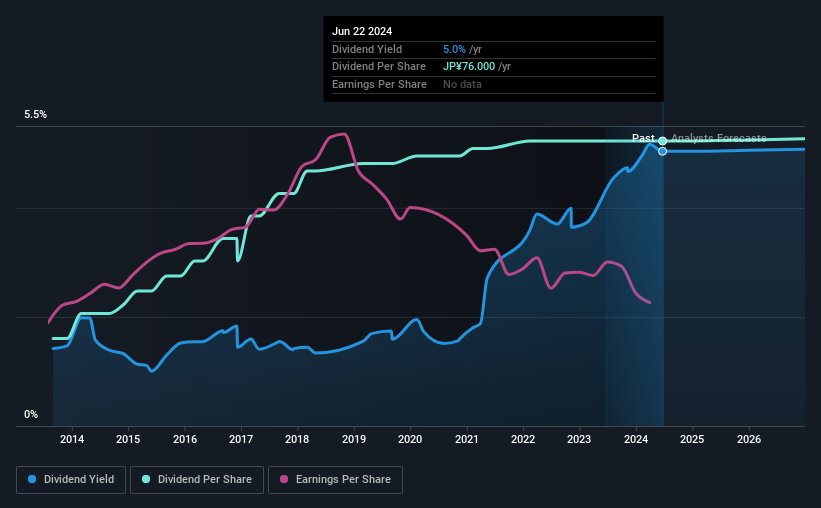Stock Analysis
- Japan
- /
- Household Products
- /
- TSE:7956
We Wouldn't Be Too Quick To Buy Pigeon Corporation (TSE:7956) Before It Goes Ex-Dividend

It looks like Pigeon Corporation (TSE:7956) is about to go ex-dividend in the next three days. Typically, the ex-dividend date is one business day before the record date which is the date on which a company determines the shareholders eligible to receive a dividend. The ex-dividend date is important because any transaction on a stock needs to have been settled before the record date in order to be eligible for a dividend. This means that investors who purchase Pigeon's shares on or after the 27th of June will not receive the dividend, which will be paid on the 4th of September.
The company's next dividend payment will be JP¥38.00 per share. Last year, in total, the company distributed JP¥76.00 to shareholders. Based on the last year's worth of payments, Pigeon stock has a trailing yield of around 5.0% on the current share price of JP¥1509.00. Dividends are a major contributor to investment returns for long term holders, but only if the dividend continues to be paid. So we need to check whether the dividend payments are covered, and if earnings are growing.
See our latest analysis for Pigeon
If a company pays out more in dividends than it earned, then the dividend might become unsustainable - hardly an ideal situation. Pigeon distributed an unsustainably high 132% of its profit as dividends to shareholders last year. Without more sustainable payment behaviour, the dividend looks precarious. Yet cash flows are even more important than profits for assessing a dividend, so we need to see if the company generated enough cash to pay its distribution. The company paid out 103% of its free cash flow over the last year, which we think is outside the ideal range for most businesses. Companies usually need cash more than they need earnings - expenses don't pay themselves - so it's not great to see it paying out so much of its cash flow.
Pigeon does have a large net cash position on the balance sheet, which could fund large dividends for a time, if the company so chose. Still, smart investors know that it is better to assess dividends relative to the cash and profit generated by the business. Paying dividends out of cash on the balance sheet is not long-term sustainable.
As Pigeon's dividend was not well covered by either earnings or cash flow, we would be concerned that this dividend could be at risk over the long term.
Click here to see the company's payout ratio, plus analyst estimates of its future dividends.

Have Earnings And Dividends Been Growing?
Businesses with shrinking earnings are tricky from a dividend perspective. If earnings fall far enough, the company could be forced to cut its dividend. With that in mind, we're discomforted by Pigeon's 13% per annum decline in earnings in the past five years. When earnings per share fall, the maximum amount of dividends that can be paid also falls.
The main way most investors will assess a company's dividend prospects is by checking the historical rate of dividend growth. In the last 10 years, Pigeon has lifted its dividend by approximately 13% a year on average. The only way to pay higher dividends when earnings are shrinking is either to pay out a larger percentage of profits, spend cash from the balance sheet, or borrow the money. Pigeon is already paying out a high percentage of its income, so without earnings growth, we're doubtful of whether this dividend will grow much in the future.
The Bottom Line
Is Pigeon an attractive dividend stock, or better left on the shelf? It's looking like an unattractive opportunity, with its earnings per share declining, while, paying out an uncomfortably high percentage of both its profits (132%) and cash flow as dividends. Unless there are grounds to believe a turnaround is imminent, this is one of the least attractive dividend stocks under this analysis. It's not that we think Pigeon is a bad company, but these characteristics don't generally lead to outstanding dividend performance.
Although, if you're still interested in Pigeon and want to know more, you'll find it very useful to know what risks this stock faces. Every company has risks, and we've spotted 1 warning sign for Pigeon you should know about.
A common investing mistake is buying the first interesting stock you see. Here you can find a full list of high-yield dividend stocks.
Valuation is complex, but we're helping make it simple.
Find out whether Pigeon is potentially over or undervalued by checking out our comprehensive analysis, which includes fair value estimates, risks and warnings, dividends, insider transactions and financial health.
View the Free AnalysisHave feedback on this article? Concerned about the content? Get in touch with us directly. Alternatively, email editorial-team (at) simplywallst.com.
This article by Simply Wall St is general in nature. We provide commentary based on historical data and analyst forecasts only using an unbiased methodology and our articles are not intended to be financial advice. It does not constitute a recommendation to buy or sell any stock, and does not take account of your objectives, or your financial situation. We aim to bring you long-term focused analysis driven by fundamental data. Note that our analysis may not factor in the latest price-sensitive company announcements or qualitative material. Simply Wall St has no position in any stocks mentioned.
Valuation is complex, but we're helping make it simple.
Find out whether Pigeon is potentially over or undervalued by checking out our comprehensive analysis, which includes fair value estimates, risks and warnings, dividends, insider transactions and financial health.
View the Free AnalysisHave feedback on this article? Concerned about the content? Get in touch with us directly. Alternatively, email editorial-team@simplywallst.com
About TSE:7956
Pigeon
Engages in the manufacture, sale, import, and export of baby and child-care products, maternity items, women’s care products, home healthcare products, and nursing care products in Japan and internationally.
Flawless balance sheet average dividend payer.

